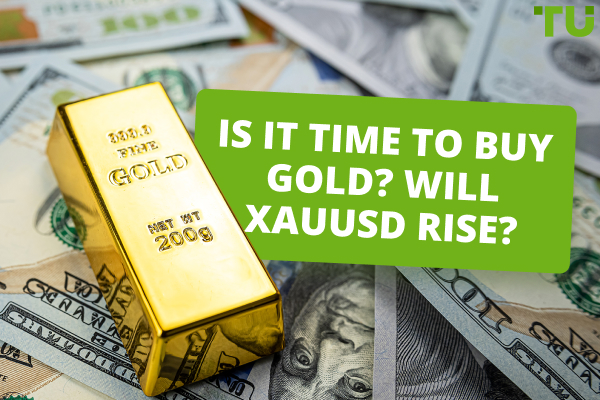Is It Smart To Invest In Gold?
Gold has a rich history and a reputation as a safe, stable long-term investment. Pros of investing in gold: portfolio diversification, inflation protection, huge demand, limited supply, long historical track record, etc. Main disadvantages: gold is not a productive asset, the price of gold can be unstable and the risk of getting into fake gold.
The question “is gold a good investment?” is one with multiple answers that differ depending on the person asking. “Good” is a subjective term, so whether gold is right for you as an investor is completely dependent on what you hope to achieve. Gold is typically seen as a safe-haven asset, and on multi-year timeframes has seen consistent growth when considering the average annual returns. However, returns are not always positive, and various factors can influence gold’s price.
Knowing all the facts can help you to make a more informed decision on whether to invest in gold or not. In this article, Traders Union will explore why people invest in gold, what affects its price, how it can be used in trading, and how it has performed historically. We’ll also look at gold’s volatility, the costs of investing in gold, and the dangers associated with gold. By the end of this guide, you should have a deeper understanding of whether gold is the right investment for you.
Do you want to buy gold? Open an account on Roboforex!-
Is it really worth it to invest in gold?
That mainly depends on your own investment goals and on when you choose to invest. Over a long period, returns on gold are almost always positive as it has a finite supply and constant demand, though some years see negative returns. Investors should also consider extra costs, such as storage and insurance.
Benefits and dangers of investing in gold
As is the case when investing real capital into any financial instrument, you must understand the risks and benefits associated with investing in gold before buying. Having a better understanding allows you to make informed trading decisions and effectively manage your portfolio. It also helps you to decide the optimal entry point for investment, as the price of gold is influenced by numerous factors.
Although gold has brought consistently positive returns when looked at on a wide enough time scale, there have historically been years where gold has produced negative returns. For example, if you invested in gold at the end of 2017, you would end up with negative returns in 2018. However, investing in 2019 to 2023 would have generated positive returns, though 2022 only saw a 0.44% return on gold. Knowing how gold investment works means you can select the best time for you to invest.
Best brokers to trade gold (XAUUSD)

Advantages of investing in gold
Let’s take a look at the many advantages of investing in gold and why each one is important.
Gold can hedge against inflation
Gold is seen by many as a hedge against inflation because its value tends to rise when the purchasing power of traditional currencies declines. Since inflation decreases the actual value of money, gold acts as a reliable store of value, preserving wealth over time and providing a safeguard against the erosive effects of rising prices.
Gold is seen as a safe-haven asset
Safe-haven assets tend to perform well when the economy doesn’t. Investors often flock to these assets rather than more volatile assets during economic downturns, particularly gold. Its perceived stability and resistance to market turbulence make it a reliable asset for weathering economic storms.
Gold provides portfolio diversification
Gold has a particularly strong draw as a tool for diversification, due to its distinctive behavior in comparison to other financial assets. Gold responds to changing economic conditions differently than other assets, and is often negatively correlated with the performance of equities. As one of the main purposes of diversification is to maintain positive returns during varying economic ups and downs, gold is a prime choice for diversifying your portfolio.
Gold is a tangible asset
Gold, in all its shiny and weighty glory, is one of those few and rare financial assets that you can physically see and hold, in the form of coins, bars, and jewelry. This tangibility provides a sense of security and permanence, especially in contrast with digital or paper-based assets. Some investors prefer forms of wealth that can be held and stored outside of the financial system, making gold a popular choice as a tangible asset.
The demand for gold is huge
The demand for gold extends way beyond simply investment opportunities. Gold is also highly sought after as a precious metal used in jewelry and various other luxury items, not to mention its use in industries such as medicine and electronics. Gold’s demand both as a commodity and a useful metal contributes to a diverse market, adding stability to its overall value.
There is a limited supply of gold
The fact that there is a finite amount of gold in the world is one of the asset’s most significant advantages, as the limited supply contributes to its intrinsic value. Mining new gold takes time and resources, which prevents rapid inflation of the total gold supply and enhances gold’s appeal as a precious metal.
The historical track record of gold is long
Gold has been used as a form of value exchange since the time of the Ancient Egyptians, but even as a modern-day financial instrument it has, over time, generated consistently positive returns when observed on a long enough time frame. Though it’s had its ups and downs, gold has more than quadrupled in value in the past twenty years. Gold’s long track record reinforces confidence in its stability.
Central banks hold gold
Most central banks across the world usually hold significant amounts of gold as part of their official reserves. The fact that central banks, which are often seen as the foundation of economic stability, use gold further underscores the commodity’s role as a store of value and strategic investment.
Gold has cultural significance
Lastly, gold holds cultural and symbolic significance throughout different societies, being most commonly associated with wealth, prestige, and special occasions. This cultural importance helps to contribute to the sustained demand for gold, particularly in regions where it plays a role in traditions, ceremonies, and social customs.
Overall, all these advantages combine to position gold as a mainstay in the world’s economy and a central component of human society, as well as a unique financial instrument providing ample trading opportunities.
Disadvantages of investing in gold
There are two sides to every coin, and although there are numerous advantages to trading gold, there are of course downsides too. Let’s look at them in some detail.
Gold is not a productive asset
Unlike stocks or bonds, which generate income or dividends, gold itself does not produce any income. Its value predominantly comes from supply, demand, and market sentiment, making it more of a store of value or speculative investment rather than a productive asset producing earnings.
The price of gold can be volatile
Although the price of gold tends to increase in the long term, its price can be highly volatile in shorter time frames and is influenced by various factors such as economic data, geopolitical events, and market sentiment. Gold’s volatility brings additional risk due to considerable fluctuations in the short term, potentially impacting investment returns.
Gold is not a necessity
Compared to other essential commodities like food or energy, gold is not a necessity for daily living. Its value is mostly driven by demand and its use for luxury purposes, making its market more susceptible to shifts in investor sentiment.
Gold can be stolen
Because gold is one of the few tangible assets, it is susceptible to being physically stolen if not sufficiently secured. To mitigate this risk, investors need to invest in secure storage, which can lead to extra costs.
Counterfeit gold can be a problem
Unlike digital assets, the authenticity or purity of gold can be compromised by counterfeit products circulating the market. When buying physical gold, investors need to be cautious and only acquire it from reputable sources to avoid being deceived, or their investment could be completely lost.
There are better ways to make money
Although gold is a valuable addition to any portfolio, particularly for diversification, it may not be the most efficient way of generating returns. Gold has a relatively slow appreciation in value over time, so relying solely on gold for wealth accumulation might not be the best approach to profit generation.
Gold has additional costs
Physically owning gold, especially when it comes to larger amounts, comes with extra costs. Gold owners need to store gold in a secure location, such as a bank vault or a private safe requires paying fees. On top of that, buying insurance for the precious metal adds another layer of expense. These costs eat into overall returns over time.
Storing and insuring gold can be expensive.
Summary
Gold has a rich history and a reputation as a safe, stable Gold has a rich history and a reputation as a safe, stable long-term investment. Its behavioral distinctiveness and protection against times of economic uncertainty make it a good investment for diversifying a portfolio. However, it does not guarantee positive returns, as is evidenced by a minority of the previous years’ annual average returns. It’s important to do your research as an investor or trader and determine if gold aligns with your own financial goals. Although predictions on the future price of gold are usually determined by experts and based on historical evidence, nobody can predict what future events will affect the price of gold.
Team that worked on the article
Jason Law is a freelance writer and journalist and a Traders Union website contributor. While his main areas of expertise are currently finance and investing, he’s also a generalist writer covering news, current events, and travel.
Jason’s experience includes being an editor for South24 News and writing for the Vietnam Times newspaper. He is also an avid investor and an active stock and cryptocurrency trader with several years of experience.
Dr. BJ Johnson is a PhD in English Language and an editor with over 15 years of experience. He earned his degree in English Language in the U.S and the UK. In 2020, Dr. Johnson joined the Traders Union team. Since then, he has created over 100 exclusive articles and edited over 300 articles of other authors.
The topics he covers include trading signals, cryptocurrencies, Forex brokers, stock brokers, expert advisors, binary options. He has also worked on the ratings of brokers and many other materials.
Dr. BJ Johnson’s motto: It always seems impossible until it’s done. You can do it.
Mirjan Hipolito is a journalist and news editor at Traders Union. She is an expert crypto writer with five years of experience in the financial markets. Her specialties are daily market news, price predictions, and Initial Coin Offerings (ICO). Mirjan is a cryptocurrency and stock trader. This deep understanding of the finance sector allows her to create informative and engaging content that helps readers easily navigate the complexities of the crypto world.










